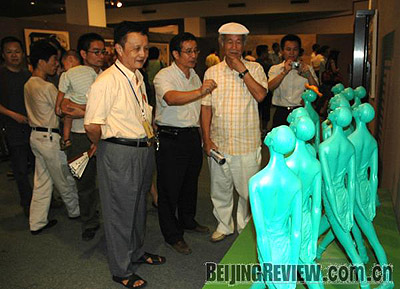|

The impact of China's economic reforms in the last three decades has been as awe-inspiring, if not more, than the country's growth rate during the period, according to a leading international economist.
As a result of the Industrial Revolution, living standards (in Britain) increased by 50 to 75 percent in a lifetime (then only about 40 years), said former president of Harvard University, Lawrence Summers. At the current growth rate in China, living standards rise 100-fold, or 10,000 percent.
Between 1978 and 2007, China's real GDP grew annually at an average of 9.8 percent, increasing more than 13 times in real terms, while per capita GDP rose from 381 yuan to 15,973 yuan.
Budget revenue grew at an average annual rate of 13.45 percent, from 113.226 billion yuan to 5.13 trillion yuan, an increase of more than 700 percent after adjusting for inflation. Over the same period, United States' federal revenue only doubled in real terms.
China's fast economic growth has vastly improved the quality of life for its population. The enrollment rate of primary schoolchildren remained steady at nearly 100 percent between 2000 and 2005, and the gross enrollment rate in junior middle schools increased from 88.6 percent to 95 percent.
The life expectancy data from the World Health Organization show China's average life expectancy was 72.4 years in 2005, compared with the world average of 67. China's overall performance in virtually all health indicators, assessed by the United Nations, surpasses developing country averages by wide margins.
Since 1978, China has implemented a policy package to reduce poverty. Today the nation has 23 million poor people, down from 218 million in 1980.
Some 70 percent of farmers have been covered by a cooperative medical insurance network though they still have to shoulder at least half of the medical costs.
But Zheng Gongcheng, a professor with Renmin University of China, is worried about the gap between rural and urban regions, as income disparity has continued to widen.
China's Gini coefficient, an internationally accepted measure of income inequality, is estimated at 0.47. Anything more than 0.4 is considered "alarming". The coefficient was 0.3 in 1982 and 0.45 in 2002.
There are 21.48 million rural poor still facing food and clothing shortages, and there still are 35.5 million low-income earners. The poor account for 6 percent of the population in rural areas and 13.7 percent in the western regions. And the number for absolute poverty would be around 100 million if the World Bank parameter of $1 a day is taken into account.
The poorest of the poor live in harsh ecological conditions, mostly in remote areas, where natural resources are scarce and public services not widely accessible. They are also being more acutely affected by weather turbulences caused by climate change as half of China's arable land is often affected by natural disasters.
A member of the Standing Committee of the National People's Congress, China's parliament, Zheng said the definition of decent livelihood itself has changed with the times. In the 1980s or '90s, being better off meant having ample food and clothing. Now it goes beyond that. "At least basic education should become a universal right."
Zheng said the leadership must understand there is much to be gained by pouring money into basic education and social security. "Social gains will come in the long run: we have made the poor potential human capital, and they will now contribute to society, making society more stable. We need to accelerate this process to realize social harmony."
(China Daily August 28, 2008) | 